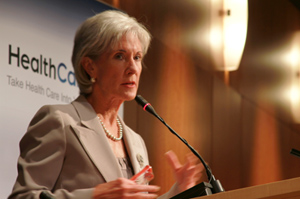Just hours before the first presidential debate, Health and Human Services Secretary Kathleen Sebelius delivered a message about the dire need to protect Medicare and Medicaid funding to a critical electoral constituency.
Sebelius was the keynote speaker at the National Hispanic Council on Aging’s National Summit in Washington, an annual meeting of Hispanic health care, housing, aging and nutrition experts. During her address, she told the audience that the Republican budget would turn Medicaid into a block grant program and cut its funding by $750 billion over the next 10 years.
“That’s almost a third of the funding for Medicaid that would be gone,” she said. “And their proposal ends Medicare as we know it by changing it from the guaranteed benefits that we currently have into a voucher program and turning seniors over to navigate and negotiate with insurance companies.”
The lead up to election day has pushed candidates from both parties to amplify their plans for the health care entitlement programs — especially as they vie for seniors’ votes. Last month, House Minority Leader Nancy Pelosi, D-Calif., said at a press conference, “Our approach has always been that the three most important issues in the campaign, in alphabetical order, have been Medicare, Medicare and Medicare.”
The GOP ticket has maintained that revamping Medicaid into a block grant would provide states greater flexilibility to administer it based on their individual needs while also easing some of the budget pressures Medicaid has created. Their proposals for Medicare would give future beneficiaries more options while making the program more sustainable over the long term.
During her speech, Sebelius also pointed to the recent collaboration between NHCOA and the Administration on Aging’s Medicare fraud prevention program called the Senior Medicare Patrol. Last year the National Hispanic Senior Medicare Patrol expanded from Texas to include Florida, a state with a high percentage of elderly Hispanics. Fraud has been an on-going issue for aging Hispanics, who, according to the initiative’s website, often “feel frightened, isolated, and misunderstood.” The program is designed to use cultural and linguistic resources such as “promotores”– or community health advocates — to educate Hispanic seniors on Medicare fraud and to provide technical assistance to organizations that cater to aging Hispanic communities. “We’ve seen this work pay off,” said Sebelius, noting that prosecutions of health care fraud cases have increased 75 percent since 2008.







